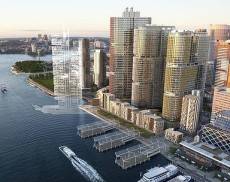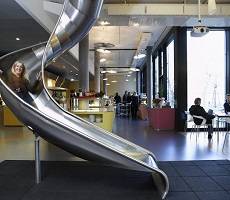May 28, 2014
Barangaroo South Tower 2 in Sydney is now Oz’s greenest large office building
 One of Sydney’s landmark new office towers has just been awarded a 6Star Green Star –Office Design V3 rating, the Green Building Council of Australia’s highest environmental accreditation. South Tower 2 in Barangaroo South is part of a $6 billion carbon-neutral development alongside Sydney Harbour. The 42 storey skyscraper is part of a three commercial building cluster in Barangaroo South called International Towers Sydney. Each of the buildings incorporates arrange of sustainable features including cooling systems using water from the harbour and solar shading. The buildings also make use of the development’s shared environmental features including an on-site backwater treatment plant which will recycle up to one million litres of water a day for use by the local community. The intention is to create a world class sustainable community in the city.
One of Sydney’s landmark new office towers has just been awarded a 6Star Green Star –Office Design V3 rating, the Green Building Council of Australia’s highest environmental accreditation. South Tower 2 in Barangaroo South is part of a $6 billion carbon-neutral development alongside Sydney Harbour. The 42 storey skyscraper is part of a three commercial building cluster in Barangaroo South called International Towers Sydney. Each of the buildings incorporates arrange of sustainable features including cooling systems using water from the harbour and solar shading. The buildings also make use of the development’s shared environmental features including an on-site backwater treatment plant which will recycle up to one million litres of water a day for use by the local community. The intention is to create a world class sustainable community in the city.





























May 27, 2014
A third of UK workers would welcome a digital assistant to free up their time
by Mark Eltringham • Comment, News, Technology
A vision of the present. © Pixar Studios
In the 2008 Pixar film WALL-E, humans have fled the planet they have destroyed in an orgy of garbage-generating mass-consumerism and been reduced to morbidly obese, sedentary lumps living vicariously through screens and whose every need is catered for by the machines around them. Well, they say the best science fiction is really about the present day and sure enough, it appears that many of us are perfectly happy with the idea of suckling at the galvanised teat of a robot overlord. A new survey carried out by ClickSoftware claims that a third of UK employees would welcome the idea of having a personal digital assistant to help them carry out everyday tasks. Over half (58 percent) hope that intelligent apps will take on at least a tenth of their workload in the future, especially those tasks considered mundane and repetitive such as administration, work scheduling and planning journeys.
More →